Stephen Street talks “Viva Hate” and trying to keep Morrissey happy
Viva Hate is 30 years old today (14 March 2018). SDE highlights this 2012 interview with producer and co-writer Stephen Street as a way to mark the occasion.
Morrissey’s debut solo album Viva Hate is reissued next week. Producer and co-writer Stephen Street talks to us about the record and gives his verdict on the reissue.
Stephen Street may not be a household name, but within the music industry and to fans of The Smiths and Blur in particular, he is a highly regarded and respected record producer. He worked with Morrissey and Johnny Marr during the mid-eighties, engineering most of The Smiths output, and his importance to their sound was underlined by a co-production credit (shared with Morrissey and Marr) on the band’s swan song – 1987’s Strangeways, Here We Come.
Street would go on to have major success with Blur in the 1990s producing four of their albums, including Parklife and US-breakthrough Blur, while his work on The Cranberries’ No Need To Argue album in 1994, reached a massive audience with sales to date of over 15 million copies worldwide.
Such is the respect for the man and his work, that a new generation of bands have sought out his services. He produced the first two Kaiser Chiefs albums (2005, 2007) and also worked with the likes of Babyshambles, The Courteeners and Pete Doherty in the later part of the last decade.
Rewind back to the summer of 1987 – The Smiths had just split up, and Morrissey was looking to record a solo album. Stephen Street had sent him a tape of some tracks that he had been working on, and they impressed the now ex-Smiths singer so much, that he suggested they work together immediately.
The results of this collaboration would be Viva Hate, Morrissey’s first solo record, released by EMI in the spring of 1988. The album was a commercial and critical success, containing some of his best known songs outside The Smiths canon, including Everyday Is Like Sunday and Suedehead.
EMI are about to reissue Viva Hate as a special edition (due 2 April in the UK/Europe) and Street has carried out the remastering for this new release. We caught up with him recently to discuss the genesis of the record, the recording of the album and his rather short-lived partnership with Morrissey.
In a candid interview, he reflects on the challenges of “trying to keep Morrissey happy”, and reveals why he thinks the ex-Smiths frontman has “butchered” a song on the new reissue.
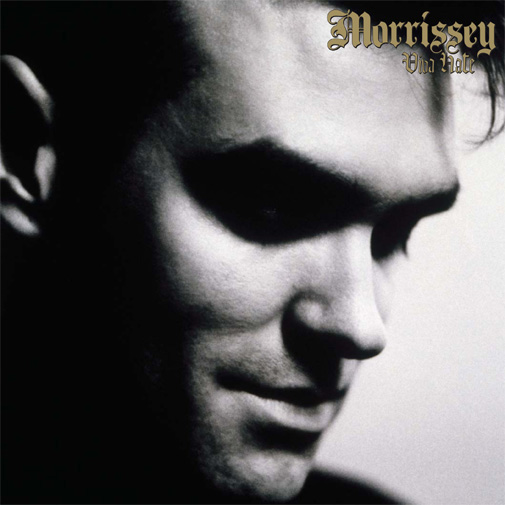
SuperDeluxeEdition: 1987 must have been a very strange and busy year for you, starting with The Smiths’ album Strangeways, Here We Come and ending with Morrissey’s Viva Hate. Were there any obvious tensions or signs that The Smiths might be heading for a split during the recording of Strangeways?
Stephen Street: It was a shock when it happened. While recording the album everything was going fine, they seemed to be in a pretty good frame of mind. There was a problem with the management situation where it was obvious in Morrissey’s mind that Ken Friedman [brought in to help manage the band] wasn’t going to be around much longer, which meant that everything was going to fall back onto Johnny’s shoulders again, as far as day to day organising was concerned and I don’t think Johnny was greatly enamoured with that idea. That was something that was brewing in the background, but actually while we in the studio everything was fine.
SDE: So it was a bolt out of the blue when the split happened?
SS: Yes. When I first heard about it I just thought it was a bit of a tiff and a flexing of political muscles between Johnny and Morrissey, and that sooner or later it would get sorted out and they’d be back together again.
SDE: After the split there was a short period where Morrissey thought about continuing with The Smiths. Could you tell us about the session with Ivor Perry [guitarist who’d been in the band Easterhouse]?
SS: There was one session with Ivor Perry. Two days were booked at a studio in Wilesden [North London] and we did one day of that. The following day, which was a Sunday, I got a phone call from Andy Rourke saying that Morrissey had gone back to Manchester and that the session was cancelled. It was quite obvious to all concerned that it wasn’t going to work with Ivor Perry. There was a song recorded on that session called Bengali In Platforms, but it was nothing like the Bengali In Platforms that subsequently ended up on Viva Hate. In fact I don’t even remember Morrissey putting the vocal down in that session – it was just a title he had knocking around.
SDE:You have posted a hand-written letter from Morrissey on your website in which he says that he would like Mike Rourke and Andy Joyce to be involved in the recording of Viva Hate. Why did that not happen in the end?
SS: He changed his mind. I guess he thought that for it to be truly regarded as a Morrissey solo record, he’d have to make a break from them. The next time I met with him after receiving that letter and discussed it further, he made it quite clear – and it was his choice not mine – that he wouldn’t work with Mike and Andy. I think he thought it would cloud the issue. Although he did go back on that idea, as we know, because they were invited back after we’d done the Viva Hate album and they worked with us on Last Of The International Playboys and Interesting Drug.
SDE: With Viva Hate what were you trying to achieve from a production point of view? Was it just a natural progression from what you had achieved on Strangeways, Here We Come?
SS: The point about a natural progression from Strangeways is a good one. With that album there was a sense of the band trying different things, such as not including any guitars on A Rush And A Push And The Land Is Ours. Johnny [Marr] had been quite keen to do a track that didn’t have typical ‘Johnny of The Smiths’ guitar all over it. He wanted to do something where he had to push himself and be a keyboard player. When Morrissey wanted to do a solo record it meant that the horizons could be broadened slightly. For example, when I gave him the track that became Break Up The Family I was quite surprised he went for it, because the general idea for that was to have quite a soul-y, funky backing track. I was just submitting ideas like this to push the envelope and keep him interested.
SDE: You took on a lot with Viva Hate – production duties, co-writing, playing bass and rhythm guitar. Did you give any thought as to how stressful that might be?
SS: I was swept away in a wave of enthusiasm, because obviously this was a marvellous opportunity. You’ve got to remember at this time that Morrissey must have been the most revered pop star in the country. I was very aware of this fact and I’m sure he was – he must have had a huge amount of nerves about it too. My worry was making a record that came out and got slated, and I’d be public enemy number one. So it was a nerve-wracking scenario. Trying to keep Morrissey happy – as a lot of people have discovered over the years – is quite a difficult thing to do. You’re walking on eggshells a lot of the time. It was draining. At the time I dropped everything else I was doing, production-wise, so I could focus purely on being his lieutenant – being his co-writer, producer and making the record. I actually did give myself a stomach ulcer by the end of the session because the pressure was pretty intense. When you consider that we didn’t actually start recording until the end of September/beginning of October and then we took a break and did some more writing, followed by more recording. To have the whole thing written and put together from September to Christmas is pretty good going really. I don’t think I’d ever have the strength to do it again, to be honest with you.
SDE: You get the feeling that Morrissey wanted to get the record out as soon as possible to underline the fact that The Smiths were over…
SS: The Smiths were always incredibly quick. Things would be recorded and Morrissey was always impatient to put it out. They’d finish a new single and it was out within the month or two. And in the case of Viva Hate EMI had been waiting a long time to put something out by The Smiths, and obviously it wasn’t The Smiths, but at least it was Morrissey, so they were very keen to put something out. What happened was that I finished the record, literally, the day before Christmas Eve that year [1987], and I didn’t really hear from Morrissey for two and a half months. It wasn’t until Suedehead [the first single] came out at the end of February – and got fantastic reviews across the board – that he got back in touch with me again. If Suedehead had come out and been a complete failure and hadn’t been a hit, I’d never have heard from him again! [laughs].
SDE: You had an almost Johnny Marr-type role with Viva Hate – co-writing, playing and producing, but since it was a Morrissey solo album you maybe didn’t have the level of ‘control’ in terms of what went on the album and what didn’t. Was that the case?
SS: Not really, because the songs we discarded from that session, we both agreed were not good enough. So everything that went on that album were songs that we both genuinely thought were the best work we had done. I wouldn’t say we were arguing about anything at all. The only thing that has happened recently with the remastering, is that Morrissey has made a few decisions that I don’t totally agree with. I wouldn’t say that we’ve argued about it, but we’ve just agreed to disagree.
SDE: Viva Hate has existed in a few incarnations – the original US release contained Hairdresser On Fire (a UK B-side) while the 1997 UK reissue had eight bonus tracks, most of which had nothing to do with Viva Hate. With the new reissue Morrissey has removed the song Ordinary Boys and replaced it with Treat Me Like A Human Being – Have you got any idea why he wanted to do this?
SS: I haven’t. I wanted to leave the album purely as it was. I just wanted to remaster it so that the EQ of the album was better, and get it sounding as good as it could possibly sound. Treat Me Like A Human Being was a demo that sat in the can for a long time. It was a personal demo, literally, a four-track recording that I’d done in my home studio. So I found that, and I’d been in touch with Morrissey for the first time in ages, and my view was that we should put it on the reissue and perhaps put some of the B-sides from the singles on there, to show what happened in that six month period. But as you know, for some reason he’s decided to take Ordinary Boys off – which I don’t understand because I actually think it’s a fine song – one of the better songs on side two – and replace it with the demo. I think it [the demo] should have been added as an extra track, rather than replacing a track.
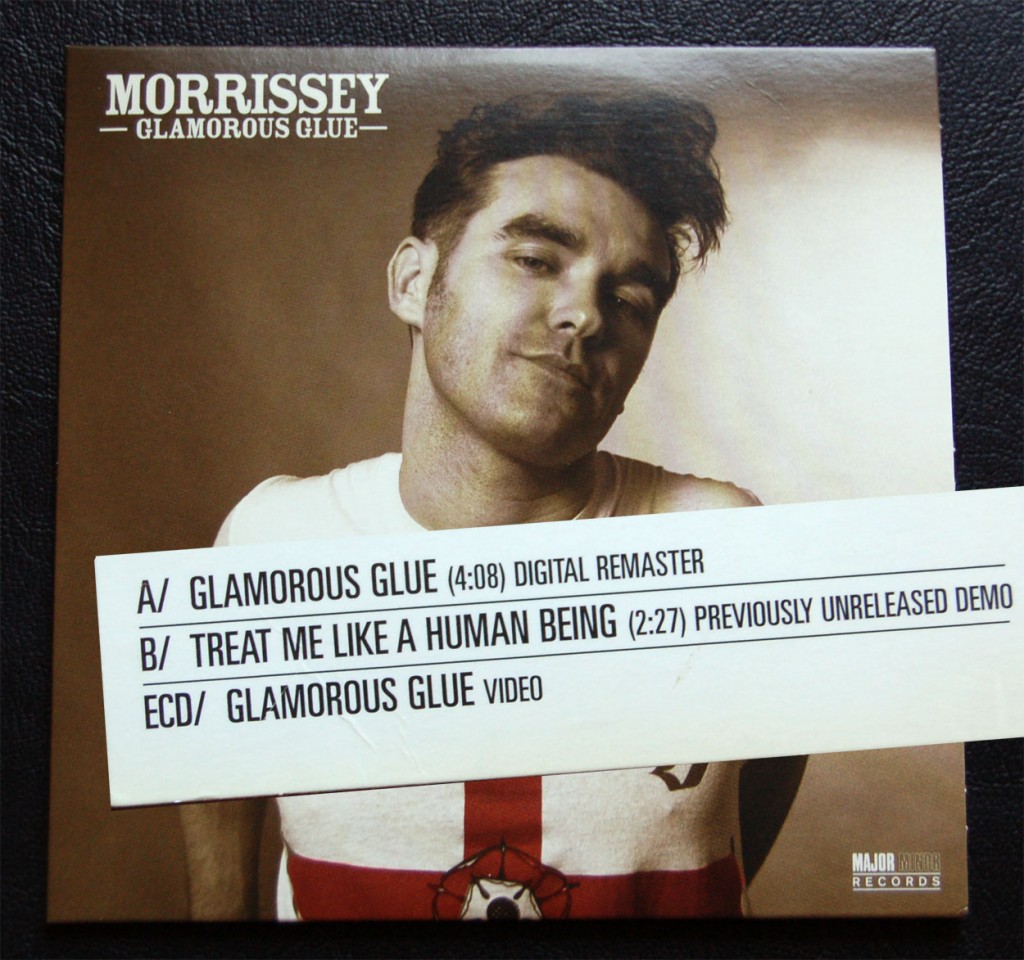
SDE: It’s curious and somewhat contrary to note that while most artists tend to expand their albums for special editions, Morrissey has chosen to remove a track from his.
SS: I think the word ‘contrary’ is the key word there! [laughs]
SDE: Treat Me Like A Human Being has already been out anyway, as the B-side to the 2011 UK re-release of Morrissey’s Glamorous Glue single.
SS: I don’t know why he did that. What happened was I hadn’t spoken to Morrissey for years and I got in touch with him again after a very long time, and I said to him, “Do you remember this track?” and he did, and so he said “Let’s use it”, and I said “Great”, thinking he was going to use it on this reissue of Viva Hate, because we were discussing it then. And then he used it on the B-side of the Glamorous Glue single, which had nothing to do with that period of time at all. I thought it was a wrong move personally, but then again he is a solo artist and he will do what he wants to do.
SDE: The B-sides and extra tracks from the Viva Hate period, although still available (notably on a three-disc Morrissey singles collection) are now somewhat lost, given that they do not form part of this special reissue.
SS: Yes, I think so. Personally, I think what should have been put on the reissue of the album is the demo and the B-sides of the period such as I Know Very Well How I Got My Name…
SDE: … And Hairdresser On Fire, which is a great track. For those in the US, this new reissue actually misses off TWO album tracks since Hairdresser was on the album over there…
SS: Yes, that should have gone on. And also, the other thing is that he’s chopped off the front and the end of Late Night, Maudlin Street, which I think, again, is a wrong move. I produced that track with an intro in mind and an outro in mind, and now both ends of it have been kind of butchered, really, in my estimation. So I’m not happy about that, either. But then again, what can I do? It’s not my album – it’s his.
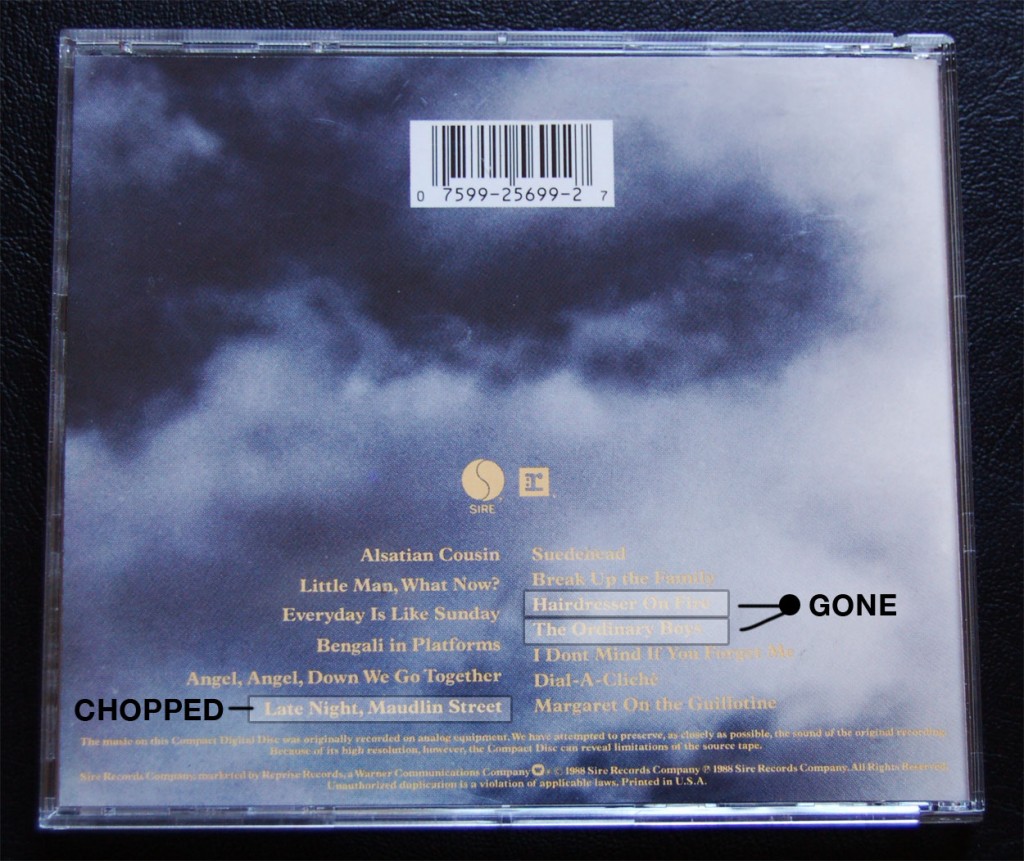
SDE: In 2010 you participated in the BBC Radio show “The Record Producers” and you were going to play some Viva Hate demos on that show – until Morrissey intervened…
SS: They were just demos, and I really wanted to show – in a complimentary way – how good the songs sounded, even as four-track demos. This was before I got back in touch with him again, so I was still a little bit of a ‘persona non grata’ at the time. I think I mentioned it on my website, and once he got word of it, we got a very strong legal letter from Morrissey’s solicitor saying how dare you do anything without the permission of Morrissey himself – you must hand over these recordings to us now. So I had to go back to Steve Levine who was producing those particular programmes and we decided that there was not much we could do about it, but he [Morrissey] had shot himself in the foot because he hadn’t won any friends at the BBC by doing that.
SDE: So I guess there was no question that those demos would have ever appeared on this new reissue?
SS: They are probably not good enough to put on the reissue of the album, but the reason why I wanted to play a little snippet of them on that radio programme – which was about me, not about him – was to show how an album grows from being a very tiny little demo idea, to a finished thing. The idea was only to play a little bit – a verse or a chorus from a demo. I had no intention of playing the whole thing. But it didn’t happen in the end.
SDE: For a lot of fans the ‘carrot’ to buy this reissue will be the remastering. Do you think Viva Hate needed remastering?
SS: It did need remastering. For some reason back in the late ‘80s when records were mastered they [mastering engineers] tended to filter out the bottom end, and they used to bring in the stereo picture a bit as well, so if things were extreme left and right they were pulled in to a more mono picture. So the width of recording and the depth of recording is not how I originally mixed it. When we went back to the tapes we had to ‘bake’ them, because they were getting to the age where they were beginning to shed slightly [on tapes of a certain age the glue that holds the oxide particles on the tape begins to break down] but it was amazing, because when you put on the original CD of Viva Hate and then you play the actual half-inch mixes, there was much more bottom end, it sounded better, warmer – a more analogue sound. And also now, the levels that records are cut at now are much louder, So if you’ve got an original Viva Hate track in iTunes, it will sound 4-5db lower than the modern record. So the idea was to get the tracks sounding better but without getting involved in the ‘loudness wars’.
SDE: I was going to ask you about that. Audiophiles are rightly vocal about their dislike for squashed dynamic range and remasters that are cranked up far too loud. I assume you didn’t go down that route?
SS: No. I briefly popped in on Johnny [Marr] when he was doing The Smiths back catalogue, and then same line of thought was applied then, which was to bring the volumes up, but not get them to the point where they are really, really loud and affecting the dynamics.
SDE: Your period with Morrissey was very successful, in terms of hit records. Why did the partnership not extend to a second album?
SS: I thought we were getting better. The quality of the B-sides that we put out on the Every Day Is Like Sunday single and then the subsequent singles we did later on that year, I thought were getting better and better. I was finding my feet more as a co-writer, but unfortunately what was still hanging over us – as there often has been in Morrissey’s career, unfortunately – was getting the paperwork tidied up. Basically, what happened was, for the producer’s royalty on the record, he initially wanted me to take the one point I got when I was working on The Smiths stuff. I pointed out that a producer worth his salt, working on a such a record would be getting three or four points, and it took months, and months and months to agree on me getting paid a royalty rate that was regarded as fair, and basically it tarnished his thoughts and feelings towards me, and I was out of the picture. It’s just one of those things unfortunately. Like the court case, money ruins everything.
SDE: Vini Reilly [guitarist on Viva Hate] came out and tried to claim credit for your work on this album. What was going on there?
SS: I don’t know. He also claimed Morrissey invited him to work on the record, when I invited him. I’d worked with Vini on a Duritti Column album the previous year. I just wanted a good guitar player, technically, who could come in and play the parts and expand on the parts that I wrote on the demo lines. So the idea was to get Vini in, a good drummer in Andrew Paresi, and I would then do the dogsbody stuff like the rhythm guitar and the bass and so on. Vini turned around and said to me “I’m not playing that song, it’s too bloody simple” – well that song was Everyday Is Like Sunday! He’s a musical snob in some respects – he’s incredibly frustrating. When he came out at the end of the record and said “those Street songs were crap, I had to rewrite them”, that was a complete load of bollocks. He also said that he wrote them in the first place, which is why I wanted to put the Viva Hate diaries on my website, to get the record straight.
SDE: Do you think Viva Hate is your best work?
SS: [Pause] It’s one of my favourite works in the sense that I know what effort was put into it, and how we worked against all the odds to come up with a record as good as that in such a short period of time. I think I’ve made better cohesive albums with The Smiths – I still think Strangeways is an incredible album. I know the fans generally think The Queen Is Dead is a better, I love that album too, don’t get me wrong, but personally, from a production point of view, I think my best work was on Strangeways. And also, I love some of the records I made with Blur, and there are other records that mean a lot to me like Pete Doherty and stuff like that. But I’m very proud of what we achieved with Viva Hate and I regard it as a very big milestone in my own career.
SDE: You mentioned that you’d been talking with Morrissey a little bit recently, does that mean you’re friends again?
SS: I was lying in bed one night thinking, this is ridiculous, not being in touch with the guy that had such a big part in my career, and here we are in our fifties now, it would be nice to at least make contact again. So I wrote a letter to him and gave it to my manager and asked her to somehow get it to Morrissey. At first we had a communication back from his representative saying, “Is this a legal letter? Do we need to get a lawyer involved?” [laughs] No! It was a personal letter, just saying “Hi, how are you?” And then he did get the letter, and got in contact with me by email. We met up in London and we had that one-night meeting in a hotel bar and had a good chat. It was really good fun, it was really lovely to see the guy again. Since then, he’s been in touch with me intermittently, but at least we are in touch by email. I know he’s going to be upset over my comments about the reissue, but what can I do?I’m a grown man, and if I feel like I disagree with him on something, I’m going to say so. And I’m sure he’ll be upset by it, but I’m only expressing my personal view.
SDE: Stephen Street, thank you.
Compare prices and pre-order

Morrissey
Viva Hate - 2012 CD reissue

|
|
||||||||||||||||||||||||||||||||||||||||||
Compare prices and pre-order

Morrissey
Viva Hate - 2012 vinyl reissue

|
|
||||||||||||||||||||||||||||||||||||||||||||||||||||||||||||
![]()
1 Alsatian Cousin (2011 Remastered Version)
2 Little Man, What Now? (2011 Remastered Version)
3 Everyday Is Like Sunday (2011 Remastered Version)
4 Bengali in Platforms (2011 Remastered Version)
5 Angel Angel Down We Go Together (2011 Remastered Version)
6 Late Night, Maudlin Street (2011 Remastered Version)
7 Suedehead (2011 Remastered Version)
8 Break Up the Family (2011 Remastered Version)
9 Treat Me Like a Human Being (2011 Remastered Version)
10 I Don’t Mind If You Forget Me (2011 Remastered Version)
11 Dial a Cliche (2011 Remastered Version)
12 Margaret On the Guillotine (2011 Remastered Version)

 Interview
Interview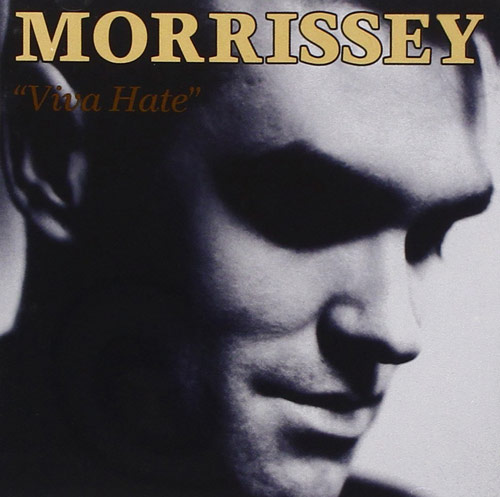
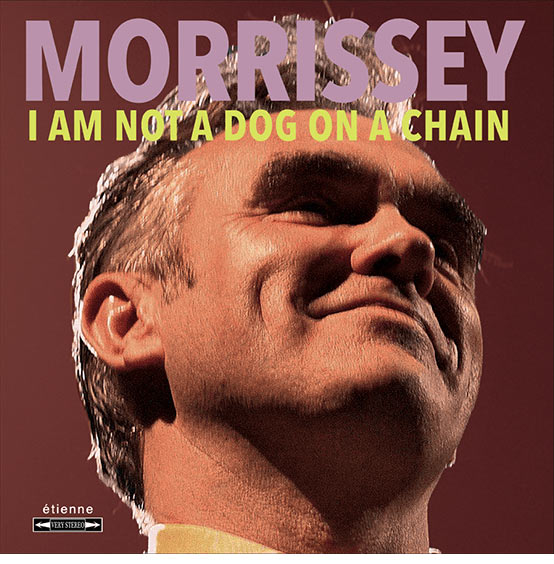
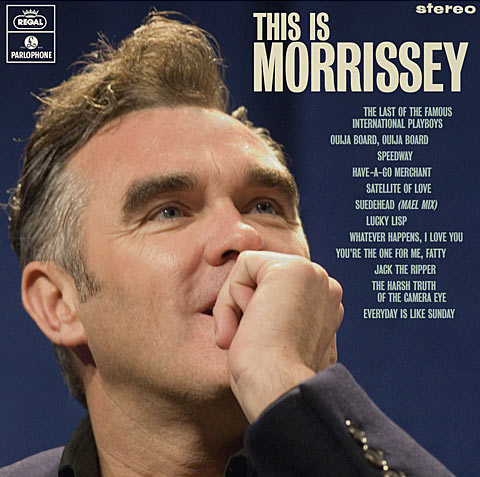

By Paul Sinclair
22